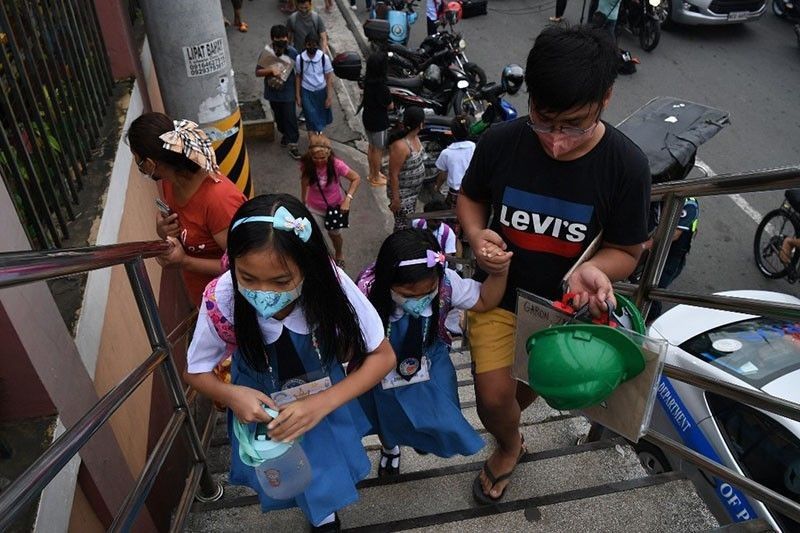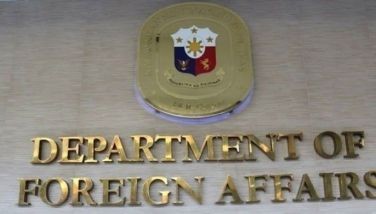PISA: Philippines 5 to 6 years behind

MANILA, Philippines — The dismal performance of the Philippines in the 2022 Program for International Student Assessment (PISA) indicates that students in the country are five to six years behind in learning competencies, according to the Department of Education (DepEd).
“If we follow the computation (of PISA) with caveats, based on the OECD (Organization for Economic Cooperation and Development) with socioeconomically advantaged students, we can see that (we) are around five to six years behind,” Alexander Sucalit, officer-in-charge of the DepEd’s Bureau of Education Assessment-Education Research Division, told reporters.
Based on the PISA report released last Tuesday, the mean scores of countries that participated in the 2022 PISA were 472 for mathematics, 476 for reading and 485 for science.
The Philippines scored about 120 points less than the average scores in its 2022 assessment: 355 for math, 347 for reading and 373 for science.
This meant that every 20 points lacking from the average represent one year of annual pace of learning of 15-year-olds in countries that participate in the PISA, according to the OECD.
“But we have to be cautious in interpreting this because different countries have different paces of learning, so it’s just an estimate for the participating countries. We look not only at this figure, but we also look at other factors,” Sucalit explained.
For the second time, the Philippines landed in the bottom 10 out of 81 countries in reading comprehension, mathematics and science, based on the 2022 PISA.
Indicators of the test, however, showed that despite moving up the rank, the performance of students showed minimal improvement.
Overall, the Philippines achieved a 2.2-percentage point hike in mathematics from 2018 to 2022, 6.9 percent in reading and a 0.8-percent drop in science proficiency.
The PISA, developed by the OECD, measures 15-year-olds’ ability to use their reading, mathematics and science knowledge and skills to meet real-life challenges.
Gina Gonong, the DepEd’s undersecretary for curriculum and teaching, expressed belief that the Philippines’ performance was still “positive,” considering most OECD countries saw a drop in performance due to the COVID-19 pandemic, but the country remained “stagnant” despite difficulties in delivering lessons during the lockdowns.
“Our education system is stable and resilient. Of course, there’s much to be desired. Maybe, a few more cycles of PISA and we can see improvements,” Gonong said at a press conference.
She added that while the Philippines aims to be a top performer in the PISA, reaching the rank of top performers like Singapore would take time, considering that education reforms are still being rolled out to respond to dismal assessments.
“Maybe, working toward matching the scores of Southeast Asian countries is more realistic in the coming years… Maybe, 2029 onwards,” the DepEd official said.
Amid these developments, Vice President and Education Secretary Sara Duterte yesterday admitted that the 2022 PISA results “bear uncomfortable truth,” but it should be a jump-off point for the country’s education system to work on its strengths and weaknesses.
“The PISA results are not merely a reflection of our education system. It is a mirror reflecting our collective efforts, investments and most importantly, our commitment to education and the future we envision for our children,” Duterte said in a statement.
“As such, this is a call to action, a call to our collective responsibility as a nation. I call on everyone to pull our efforts together for a more resilient MATATAG education system, an education system that aims to improve learning outcomes, prioritize student and teacher well-being, and promote accountability to close remaining disparities,” she added.
Under Duterte, the DepEd has implemented sweeping reforms to improve students’ performance in mathematics, science and reading comprehension despite calls from education sector stakeholders to implement policies where experts have been consulted.
This includes “Catch-up Fridays” in all public schools, where starting next year, students will spend Fridays mastering reading comprehension and critical thinking, reducing the traditional learning delivery for students by one day.
Much work needed
Much work needs to be done as the country’s education system is in its worst state, the Philippine Business for Education (PBEd) said following the release of the 2022 PISA.
The poor performance of Filipino students is not just a problem of the education sector, but of the entire country, according to the PBEd.
It said the weakness of the basic education system would eventually translate into weakness of the workforce, which, in turn, would affect the productivity and key source of economic growth and competitiveness.
“A crisis of this magnitude requires swift action and great effort from all sectors. As the voice of business in education reform, we hope to rally once more our partners in the industry, government and academe to take action for education – through the window of opportunity that we have in the ongoing work of the Second Congressional Commission on Education,” the group said.
“Nevertheless, we welcome our continuous participation in large-scale international learning assessments as this provides us the measurement of the impact of the pandemic on learning. Efforts must also be made to use this assessment as guidance to improve our current situation and see the value of making data-driven decisions in education governance,” it added.
The PBEd said the latest PISA results “show the dire need of Filipino learners of our full support.”
Pandemic recovery
The government should not lose the urgency in stemming the country’s education crisis and accelerating learning recovery despite a slight improvement in the Philippines’ average performance in the 2022 PISA, Sen. Sherwin Gatchalian said yesterday.
Gatchalian, who chairs the Senate committee on basic education, said there was a slight improvement of +2.66 points in the country’s average performance in the 2022 PISA.
“We must continue to focus on the recovery of the education sector from the COVID-19 pandemic that caused the crisis. We still have many reforms to promote to ensure quality education for every Filipino youth,” he added.
Analysis of learner-level data by the OECD revealed that increases in reading and math scores and the decrease in the science score among Filipino learners are not statistically significant.
While the 2022 PISA results suggested that the learners did not regress despite the COVID-19 pandemic, Gatchalian emphasized that the changes in scores were insignificant.
Among the senator’s proposed next steps are the intensification of the DepEd’s learning recovery programs and the enactment of Senate Bill 1604, or the ARAL Program Act.
He has been advocating for the swift passage of the ARAL Bill, which the Senate has already approved on third and final reading last March.
The proposed measure seeks to address pandemic-related learning loss and ensure that learners have access to well-designed remediation plans.
Gatchalian is eyeing a budget of P10 billion for the rollout of academic recovery.
Help from CHED
The Commission on Higher Education (CHED) extended its hand to the DepEd to help improve students’ performance in large-scale international assessments like the PISA.
“More importantly, we want to realize the national education vision laid out in the Philippine Development Plan (2023-2028) in order to ensure that all Filipinos are able to realize their full potential to keep pace with the envisioned socioeconomic transformation,” CHED Chairman Prospero de Vera III said in a statement.
Among the efforts that CHED would extend to the DepEd is to engage colleges and universities whose teacher programs are centers of excellence or development to study details of country reports to provide solutions for the DepEd.
ACT Teachers party-list Rep. France Castro yesterday underscored the need to raise the budget for education as she lamented the “dismal performance” of Filipino students in the 2022 PISA.
In a statement, Castro said the country’s performance in reading, mathematics and science was “about the same” as in 2018, when it ranked lowest in those subjects among 79 participating countries.
This only means that the programs implemented by the DepEd “from then till now are ineffective and (have) not addressed the learning crisis,” according to the lawmaker.
“It also highlights the dire need to increase the budget of the education system of the country to at least six percent of our gross domestic product, with a thrust for building more classrooms, hiring more teachers and increasing their salaries as well as adopting a curriculum that would make learning easier for students and more attuned to the Philippine situation,” she said. – Janvic Mateo, Cecille Suerte Felipe, Sheila Crisostomo
- Latest
- Trending






























